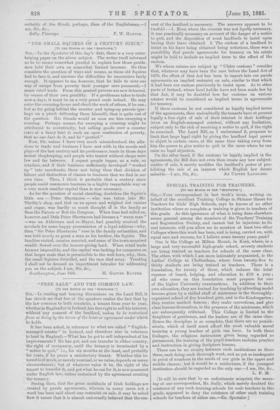"THE SMALL SQUIRES OF A. CENTURY SINCE." En THE EDITOR
OF THE "SPECTATOR.") SIR,—In the Spectator of this day's date, there is a very enter-
taining paper on the above subject. The writer (well informed as he is) seems somewhat puzzled to explain how those gentle- men held their own on somewhat limited incomes. He then considers the question of ways and means, as these old Squires had to face it, and answers the difficulties be encounters fairly enough. It appears to me, however, that he fails to note one way of escape from poverty their younger sons possessed,—I mean retail trade. From this genteel persons are now debarred, by reason of their own gentility. If a gentleman takes to trade now-a-days, it must be on a very grand scale indeed. He may enter the counting-house and check the work of others, if he can ; but as for going behind the counter and tying-up parcels (per- haps on a pinch delivering them himself), that is quite out of the question. His friends would as soon see him sweeping a crossing. Perhaps sooner, for sweeping a crossing might be attributed to eccentricity, but selling goods over a counter (save at a fancy fair) is such an open confession of poverty, that no one dare do it, and be "genteel."
, Now, Sir, unless I have very much misunderstood the allu- sions to trade and business I have met with in the novels and plays of the last century and its predecessor, trade in those days meant ehopkeeping, and people who traded without shops were few and far between. I expect people began, as a rule, as retailers, and if their business sufficiently developed "worked up" into merchants, there not being then that division of labour and distinction of classes in business that we find in our own time. Thus, I think it probable that a century since people could commence business in a highly respectable way on a very much smaller capital than is now necessary.
As for the question of social standing, doubtless the Squire's
little son — Peter Shortacres — who was taken into Mr. Thrifty's shop, and, tied on an apron and weighed Out raisins and sugar, was hardly so much thought or in the family as Sam the Parson or Bob the Dragoon. When time had rolled on, however, and little Peter Shortacres had become a " warm man" .—was an Alderman and ex-Mayor, had possibly received the accolade for some happy presentation of a loyal address—why, then "Sit' Peter Shortacres " rose in the family estimation, and was held nearly as great a man as his brother, the Squire. The families visited, cousins married, and some of the town-acquired wealth flowed over the honour-giving land. When retail trade became impossible, and the capital was lacking for commerce on that larger scale that is permissible to the well-born, why, then, the small Squires dwindled, and the race died away. Trusting I shall not be deemed an impertinent intruder for addressing you on the subject, I am, Sir, &c.,



















 Previous page
Previous page